(完整word版)四年级一般过去时
(完整word版)一般过去时及特殊疑问句

一般过去时一、一般过去时的简介:定义:表示过去某时发生的动作或存在的状态.结构:“主语+动词的过去式”用法:1。
表示过去某个时间发生的动作或存在的状态。
He was here yesterday.I got up at seven yesterday morning.My mother was at work yesterday afternoon.Did you have a good time last summer?2。
表示过去经常或反复发生的动作。
My mother often went to work by taxi last year.When I was a student, I often listened to music.3。
常与一般过去时态连用的时间有:at that time, then, at that moment, yesterday, yesterday morning (afternoon, evening…)last night (week, month, year…),一段时间+ago(several days ago), two days ago, a week ago, three years ago…in 1990,(in 1997…) ,just now, long before, long long ago二. 动词过去式构成规则1、一般在动词原形末尾加– edhelp → helped, look → looked, play → played, work → worked, listen → listened, wash →washed, clean → cleaned,2、结尾是 e 的动词加 -- dlive--—lived hope———hoped use-—-used like ——- liked3、末尾只有一个辅音字母的重读闭音节,先双写这个辅音字母,再加-ed。
(完整版)小学英语一般过去时总结(可编辑修改word版)
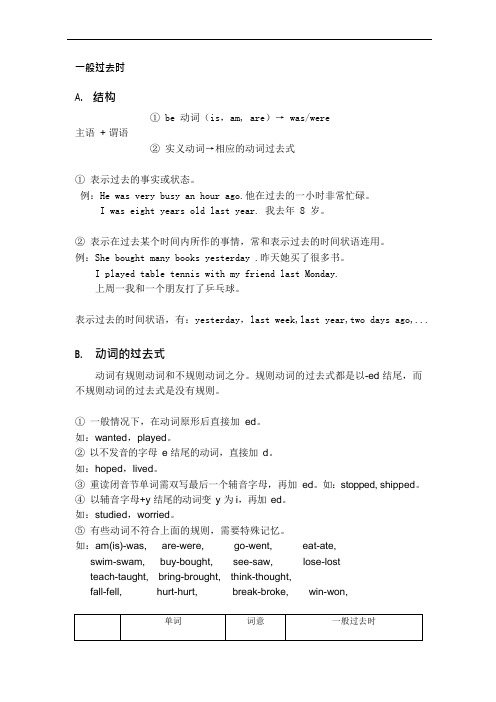
一般过去时A.结构① be 动词(is,am, are)→ was/were主语+ 谓语②实义动词→相应的动词过去式①表示过去的事实或状态。
例:He was very busy an hour ago.他在过去的一小时非常忙碌。
I was eight years old last year. 我去年 8 岁。
②表示在过去某个时间内所作的事情,常和表示过去的时间状语连用。
例:She bought many books yesterday .昨天她买了很多书。
I played table tennis with my friend last Monday.上周一我和一个朋友打了乒乓球。
表示过去的时间状语,有:yesterday,last week,last year,two days ago,...B. 动词的过去式动词有规则动词和不规则动词之分。
规则动词的过去式都是以-ed 结尾,而不规则动词的过去式是没有规则。
①一般情况下,在动词原形后直接加ed。
如:wanted,played。
②以不发音的字母e 结尾的动词,直接加d。
如:hoped,lived。
③重读闭音节单词需双写最后一个辅音字母,再加ed。
如:stopped, shipped。
④以辅音字母+y 结尾的动词变y 为i,再加ed。
如:studied,worried。
⑤有些动词不符合上面的规则,需要特殊记忆。
如:am(is)-was, are-were, go-went, eat-ate,swim-swam, buy-bought, see-saw, lose-lostteach-taught, bring-brought, think-thought,fall-fell, hurt-hurt, break-broke, win-won,直接加edwalk 走climb 爬turn 转弯learn 学习cook dinner 做饭play the piano 弹钢琴visit grandparents 看望(外)祖父母clean the bedroom 打扫卧室wash the clothes 洗衣服answer the phone 接电话listen to music 听音乐clean the room 打扫房间collect insects 收集昆虫jump 跳row 划work 工作show 展示look 看help 帮助relax 放松return 归还pass 传递watch insects 观察昆虫pick up leaves 采摘树叶paint 绘画kick 踢ski 滑雪直接加dlike 像,喜欢live 居住dance 跳舞use a computer 使用计算机love 爱taste 尝close 关上prepare 准备不规则变化eat 吃have 有;吃buy 买take 买;带go 去sing 唱歌teach(taught)教run(ran)跑fight(fought)打架get up 起床swim 游泳fly 飞swing(swung)荡sleep(slept)睡觉sweep(swept) the floor 扫地do 做make the bed 铺床draw(drew) pictures 画画write(wrote) a letter 写信catch(caught)butterflies 捉蝴蝶meet(met) 见面drink(drank)喝tell(told)告诉ride(rode)骑find(found)寻找到drive(drove)驾驶come(came)来become(became)变成feel(felt)感觉到think(thought)思考meet(met)遇见fall(fell)落下leave 离开wake(woke) up 醒来bring 带来is am are see 看到grow 种植grew stand(stood)站立词形不变read books 读书put 放set the table 摆饭桌hit (hit)撞击、打cut 切、割最后一个字母双写再加edstop(stopped)停shop 购物把y 变成i 再加edempty the trash 倒垃圾study 学习C. 过去式的肯定、否定、疑问及简短回答①过去式的肯定、否定、疑问及简短回答的形式可表示如下:肯定句I (He, She, We, You, They) went there by bus.否定句I (He, She, We, You, They) didn't go there by bus.疑问句Did I (he, she, we, you ,they) go the by bus?简短回答Yes, I (He, She, We, You, They) did.No, I (He, She, We, You, They) didn't.动词be 的肯定、否定、疑问及简短回答形式如下:肯定句I (He, She) was there.We (You, They) were there.否定句I (He, She) wasn't there.We (You, They) weren't there疑问句Was I (he, she) there?Were we (you, they) there?简短回答No, I (he, she) wasn't.we (you, they) weren't.一、将下列动词变成过去式。
(完整版)一般过去时的概念及用法

一般过去时的概念及用法一、基本概念一般过去时(simple past tense)表示过去某个时间里发生的非持续性动作或存在的状态,也表示经常或反复发生的动作。
用动词的过去式表示,常和表示过去的时间状语连用,如:yesterday,last night,in 1990,two days ago,before,the age of等。
一般过去时也表示过去经常或反复发生的动作,常和often,always等表示频率的时间状语连用。
表示过去习惯性、经常性的动作、行为;过去主语所具备的能力和性格。
二、动词变化1.直接加ed: work—- worked look——looked2.以不发音e结尾的单词,直接加d: live ——lived hope-—hoped use——used3.以辅音字母+y结尾的,变y为i加ed: study——studied carry—-carried worry--worried 4.以一个辅音字母结尾的,双写最后的辅音字母+ed: stop—— stopped plan-—planned重读闭音节体现形式为辅-元-辅结构,例如nod, n为辅音,o为元音,d为辅音。
5。
以ic结尾的动词,要把ic变成ick再加ed,如picnic→picnicked,traffic→traffic ked 6.不规则变化的动词过去式:have---had are-—-were get-—-got say--—said feel——-felt do/does———did is---was go—--went drink——drank eat—-ate bring-———brought think-—--thought buy----bought catch--—- caught teach ---—taught sit-———sat wear—--—wore cut———-cut sweep----swept sleep-—slept see--——saw become-—-—became read-—read7.以辅元辅结尾的加d三、用法(1)一般过去时表示在过去某个特定时间发生,也可以表示过去习惯性、经常性的动作.一般不强调动作的影响,只说明的事情。
(完整word版)一般过去时时表格

基本概念:一般过去时表示过去某个时间里发生的动作或状态;过去习惯性、经常性的动作、行为;过去主语所具备的能力和性格。
通常与yesterday, last month,last monday, two days ago等表示过去的时间状语连用。
肯定句:主语+was/were+其他否定句:主语+was/were+not +其他表状态疑问句:was/were+主语+其他+?肯定回答:yes, 主语+was/were, 否定回答:no, 主语+was/were+not注意:be (am,is, are)(am, is 的过去式为was, are的过去式为were )一般过去时基本构成肯定句:主语+动词过去式+其他否定句:主语+助动词(did)+not+动词原形+其他(注意,当改为否定句的时候,需要将动词还原)表动作疑问句:did+主语+动词原形+其他+?(注意,当改为疑问句的时候,需要将动词还原)肯定回答:yes, 主语+did,否定回答:no, 主语+didn’t注意:助动词主要为:do 和does的过去式为did.1、表示过去的动作,除用一般过去时,还可用used to do sth,来表示过去常常做某事,但现在不做了.如:he used to smoke a lot 他过去抽烟很凶特殊用法:2、用在特殊句式中,主要为it is (high /about) time that sb should do / did sthit is (high /about)time that we should begin / began our class3、would rather sb did sth 主语宁愿某人做某事,即用一般过去时表示过去现在或将来要做的事,如:I would rather you met her tomorrow过去式动词的变化规则eat-ate take-took run-ran sing-sang put-put make-made read-read write-wrote draw-drewdrink-drank fly-flew ride-rode speak-spoke sweep-swept swim-swam sit-sat。
完整word版一般过去时讲解
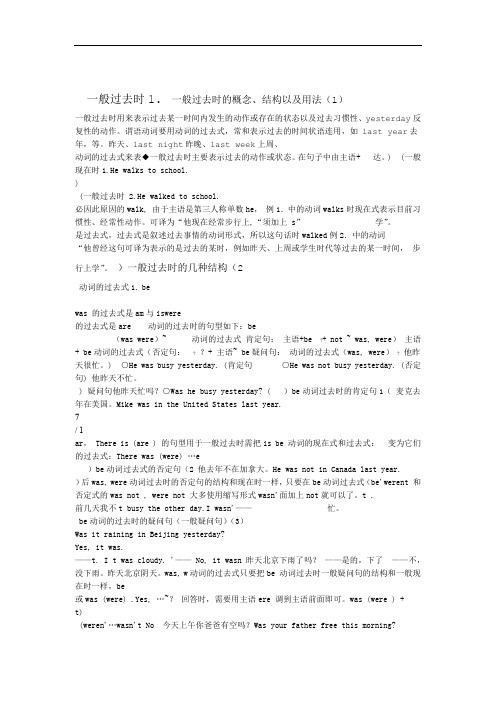
一般过去时1.一般过去时的概念、结构以及用法(1)一般过去时用来表示过去某一时间内发生的动作或存在的状态以及过去习惯性、yesterday反复性的动作。
谓语动词要用动词的过去式,常和表示过去的时间状语连用,如 last year去年,等。
昨天、last night昨晚、last week上周、动词的过去式来表◆一般过去时主要表示过去的动作或状态。
在句子中由主语+ 达。
) (一般现在时1.He walks to school.)(一般过去时 2.He walked to school.必因此原因的walk, 由于主语是第三人称单数he,例1.中的动词walks时现在式表示目前习惯性、经常性动作。
可译为“他现在经常步行上,“须加上 s”学”。
是过去式,过去式是叙述过去事情的动词形式,所以这句话时walked例2.中的动词“他曾经这句可译为表示的是过去的某时,例如昨天、上周或学生时代等过去的某一时间,步行上学”。
)一般过去时的几种结构(2动词的过去式1.bewas 的过去式是am与iswere的过去式是are 动词的过去时的句型如下:be(was were)~ 动词的过去式肯定句:主语+be ?+ not ~ was, were)主语+ be动词的过去式(否定句:??+ 主语~ be疑问句:动词的过去式(was, were)?他昨天很忙。
) ○He was busy yesterday. (肯定句○He was not busy yesterday. (否定句) 他昨天不忙。
) 疑问句他昨天忙吗?○Was he busy yesterday? ( )be动词过去时的肯定句1(麦克去年在美国。
Mike was in the United States last year.7/ 1ar, There is (are ) 的句型用于一般过去时需把is be 动词的现在式和过去式:变为它们的过去式:There was (were) …e)be动词过去式的否定句(2 他去年不在加拿大。
小学语法经典总结---一般过去时1Microsoft Word 文档

1.一般过去时表示过去发生的动作或存在的状态,通常与过去的时间状语连用:yesterday ,last week(month,year)(1)系动词be的过去时: am(is) →was, are →were陈述句:He was at home yesterday.否定句:He wasn’t at home yesterday.疑问句:Was he at home yesterday?Yes ,he was./No ,he wasn’t.(2)行为动词的一般过去时:陈述句:主语+动词过去式+其它I go to the movie. →I went to the movie.否定句:主语+助动词didn’t+动词原形+其它I don’t go to school today. →I didn’t go to school. 一般疑问句:Did +主语+动词原形+其它Do you have breakfast? →Did you have breakfast? Yes,I do./No,I don’t. Yes,I did./No,I didn’t.(3)规则动词的过去式变化规则变化规则例词一般在词尾加—ed. play→played以不发音的e结尾的,只加--d. like →likedlove →loved以辅音字母+y 结尾的,变y为i ,再加—ed. study →studiedcarry →carried以一个辅音字母结尾的重读闭音节,先双写这个辅音字母,再加-ed stop →stopped plan →planned动词不规则变化:do →did have →had go →wentsee →saw read →read get →gotgive →gave sleep →slept eat →atewrite →wrote find_---found2. what’s the date today? It’s …3. What was the date yesterday? It was…4. What’s the weather like today? It’s …?5. How was your weekend?6.What did she do ? She did her homework7.What did he do last weekend ? He played soccer.8.It’s time to go home= It’s time for home。
(完整word)一般过去时练习

时态训练一般过去时(一)I。
一般过去时:表示过去某个时间里发生的动作或状态;过去习惯性、经常性的动作、行为;过去主语所具备的能力和性格。
基本结构:主语+动词过去式+其他 I was at school yesterday 。
I went to America last year 。
否定形式①was/were+not;②在行为动词前加didn’t,同时还原行为动词I wasn’t at school yesterday 。
I didn’t go to America last year ?一般疑问句:Was/ Were +主语+其他?Were you at school yesterday ?Did+主语+动词原形+其他?Did you go to America last year ?时间状语: then那时 yesterday 昨天 at that time在那个时候last night昨天晚上 last week上周 last month上个月 last year去年(last…上一个…)ago 之前 three days ago三天前 many years ago许多年前规则动词变过去式:1、一般直接+ed:walk---walked play--—played start—--started2、以不发音的e结尾的只+d:live———lived hope--—hoped use-——used3、以“辅音字母+y”结尾的动词,先变“y”为“i”再+ed:study--—studied carry———carried4。
以元音字母+y结尾的,直接加ed:enjoy—-—— enjoyed play——--played4、末尾只有一个辅音字母的重读闭音节词,双写末尾的辅音字母再+ed:drop—-—dropped skip---skipped stop——-stopped4.不规则变化:have/has —-had eat—ate see—saw am/is—was are—were go—wentdo—did take-took run—ran sleep—slept get—got meet-metbring—brought buy—bought think—thought can—could write—wrote read—read tell—told say—said give—gave feel—felt fall—fell teach—taughtmake—made send—sent lose—lost swim—swam drink—drankring-rang win—won put—put cut-cut let—let时态训练一般过去时(二)I.写出下列动词的过去式:get --—-_________ come ———-_________ watch -———_________ have ———-_________am/is --——_________ are ————_________ live—--—_________ talk-—-—_________cook -——-_________ work-——-_________ can -———_________ like—--—_________read-——-_________ write —-——_________ dance-—-—_________ give——--_________teach-—-—_________ study—-——_________ eat ———-_________ drink--——_________bring———-_________ help-——-_________ want —---_________ use—---_________stay ————_________ visit--—-_________ ride--—-_________ take -——-_________climb ----_________ wear---—_________ laugh ——--_________ go--—-_________sleep--—-_________ put--—-_________ borrow ———-_________ wait———-_________send-———_________ tell-——-_________ carry -—--_________ drop——-—_________make —--—_________ finish————_________ run —-——_________ meet--—-_________walk————_________ see-—-—_________ wash —-——_________ bump ——--_________play——--_________ skip-——-_________ ring ——--_________ carry —-—-_________win —--—_________ lose----_________ listen--—-_________ fall -—-—_________photo —--—_________ rain ——-—_________ jump—-——_________ happen----________hope ——-—_________ look ———-_________ stop ——-—_________ swim ——-—_________一般过去时(三)单项选择()1。
(完整word版)八大时态标志词
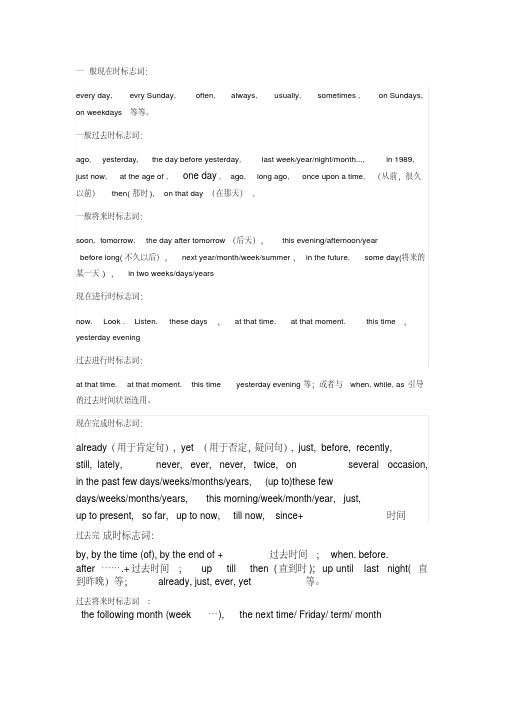
一般现在时标志词:every day, evry Sunday, often, always, usually, sometimes , on Sundays,on weekdays等等。
一般过去时标志词:ago, yesterday, the day before yesterday, last week/year/night/month..., in 1989,just now, at the age of , one day, ago, long ago, once upon a time,(从前,很久以前)then(那时), on that day(在那天),一般将来时标志词:soon, tomorrow, the day after tomorrow(后天),this evening/afternoon/yearbefore long(不久以后),next year/month/week/summer,in the future, some day(将来的某一天) ,in two weeks/days/years现在进行时标志词:now. Look. Listen. these days ,at that time. at that moment. this time ,yesterday evening过去进行时标志词:at that time. at that moment. this time yesterday evening等;或者与when, while, as引导的过去时间状语连用。
现在完成时标志词:already(用于肯定句), yet(用于否定,疑问句), just, before, recently,still, lately, never, ever, never, twice, on several occasion, in the past few days/weeks/months/years, (up to)these fewdays/weeks/months/years, this morning/week/month/year, just,up to present, so far, up to now, till now, since+时间过去完成时标志词:by, by the time (of), by the end of + 过去时间; when. before. after…….+过去时间; up till then (直到时); up until last night(直到昨晚)等; already, just, ever, yet 等。
(完整word版)小学英语四种时态总结
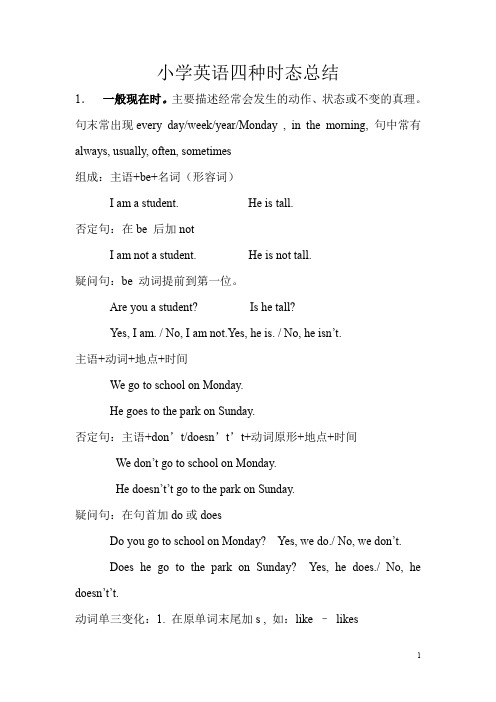
小学英语四种时态总结1.一般现在时。
主要描述经常会发生的动作、状态或不变的真理。
句末常出现every day/week/year/Monday , in the morning, 句中常有always, usually, often, sometimes组成:主语+be+名词(形容词)I am a student. He is tall.否定句:在be 后加notI am not a student. He is not tall.疑问句:be 动词提前到第一位。
Are you a student? Is he tall?Yes, I am. / No, I am not.Yes, he is. / No, he isn’t.主语+动词+地点+时间We go to school on Monday.He goes to the park on Sunday.否定句:主语+don’t/doesn’t’t+动词原形+地点+时间We don’t go to school on Monday.He doesn’t’t go to the park on Sunday.疑问句:在句首加do或doesDo you go to school on Monday? Yes, we do./ No, we don’t.Does he go to the park on Sunday? Yes, he does./ No, he doesn’t’t.动词单三变化:1. 在原单词末尾加s , 如:like –likes2. 单词以o, sh, ch, s, x 结尾加es, 如:go –goes3. 单词末尾为辅音+y结尾去y加ies 如:study- studies2. 现在进行时:主要叙述正在发生的事情。
句末常出现now, 句首常出现look, listen组成:主语+be +动词ing形式I am reading English.They are swimming.He is playing football.否定句:在be后加notI am not reading English.They are not swimming.He is not playing football.疑问句:将be 放到第一位。
(完整word版)一般过去时语法总结(1),推荐文档

重点语法
一般过去时
1.定义:表示过去发生的事情。
2.一般过去式be动词用was,were。
3.一般过去时动词要用过去式,动词变过去式规则:
1)一般直接加ed.
2)以不发音的e结尾直接加d.
3)辅音+y结尾,把y改i+ed.
4)辅元辅,倒着数,双写最后的字母+ed.
4.一般过去时关键词:
yesterday(昨天),last year(去年),last month(上个月),last night(昨晚),last week(上周),three days ago(三天前),in+过去年份(如in 2001),this morning(今天早上)等等。
5. 不规则动词的过去式形式:
6.一般过去式一般疑问句:
be动词was,were时,把was,were放在句首。
Was there any +可数名词单数或不可数名词....? Yes, there was./No, there wasn’t.
Were there any+可数名词复数.....?
Yes, there were./No, there weren’t.
有动词时变一般疑问句,把Did放句首,动词恢复原形。
Did+主语+动词原形....?
Yes,...did./No,...didn’t.
7.一般过去时的特殊疑问句形式:
What did+主语+动词原形...?
回答:主语+动词过去式...。
(word完整版)英语一般过去时语法知识归纳总结(2),推荐文档

一般过去时语法知识一般过去时表示过去某个时间发生的动作或状态;过去习惯性、经常性的动作、行为;主语在过去时间段所具备的能力和性格。
一般过去时句子最明显的现象就是常由表达过去时间的副词、副词短语或从句来界定。
“过去”的概念并不仅指如“yesterday, last week,……”等,实际上...“.非现在......“.与现在对立的过去........”.,亦即的以前..”.形成对立,就必...............“.现在...........“.过了说话时间的几分钟之前............”.,只要所要表达的时间与说话时的...”.,哪怕是须使用一般过去时来表达。
............例如:He was here only a few minutes ago. 仅仅几分钟前他还在这里。
I came home just now. 我刚回到家。
“this + 时间,today”等时间副词常用于修饰一般现在时,但是只要..........”.对立,..句子的本意是......“.与说话时的现在即使句子中有..必须使用一般过去时。
..........例如:......“.th..i.s. + .时间,....,也.....”.等.时间副词...todayI got up very early this morning. 今天早晨我起床很早。
He was late for school again today. 今天他又迟到了。
强化理解:1. 一般过去时表示在过去某个特定时刻或时期所发生的事情,也可以表示过去习惯性、经常性的动作。
一般过去时只说明过去的事情...........。
..............,.不强调动作对现在的影响I had a word with Julia this morning. 今天早晨,我跟朱丽亚说了几句话。
He smoked many cigarettes a day until he gave up. 他没有戒烟的那阵子,抽烟抽得可凶了。
(word完整版)一般现在时-现在进行时-一般将来时-一般过去时

一般现在时一、含义:)的特征、状态,主语+be(am/is/ are)+其他主语+be(am/is/ are)+not+其他主语(非三单)+动词原形+其他主语(非三单)+don’t+动词原形+其他主语(三单)+动词三单形式+其他主语(三单)+doesn't+动词原形+其他always、usually、often、等频率副词;every week(day、year…)、once a week,on Sunday等时间状语;三、第三人称单数形式构成规则:1、大多数动词在词尾加“S"如:read-reads以不发音字母“e"结尾的开音节词,加“s” 如: make-makes2、以“s, x, ch, sh,o"结尾的,在词尾加“es”如: go-goes, guess—guesses, fix-fixes3、以辅音字母加“y”结尾的,要先将“y”变为“i"再加“es”,如: fly-flies,carry—carries, worry-worries, study—studies以元音字母加“y”结尾的,直接加“S”,如: play-plays, stop—stops, say-says4、特殊:错误!be动词包括:am, is, are第三人称单数为is 错误!have -has四、写出下列动词的第三人称单数形式:visit-— guess-- take-— go—- rush-—feel——cook——wash——fly-- be--say-—run——do—— worry-—live-—watch-—enjoy—- have——like—- play--use-— teach--buy-- study-—drink—— stay--make—— plant——trip-- carry--come——cry--五、用括号内动词的适当形式填空。
1. She often __________ (have)lunch at home。
一般过去时全文

3.一般疑问句:Be动词 / Did+主语+动词原形+其 他?
如:Were you in school last Friday? Did your mother cook dinner last night? Did you wash your clothes last Sunday?
4.特殊疑问句:特殊疑问词+一般疑问句? 如:I was at home yesterday. → Where were you yesterday?
2. 用所给动词的适当形式填空。 (1)Did you _p_l_a_y_ (play) the piano yesterday? (2)I _w_r_o_t_e (write) a letter last night. (3)Who _c_l_e_a_n_e_d_ (clean) the window yesterday? (4)Sarah__ra_n__ (run) to school this morning. (5)Tom _w_e_n_t_ (go) to the park last Sunday.
1. It
(be) Mary's birthday last Friday.
2. We all
(have) a good time last night.
解析:本题考查动词的过去式。1,2小题中的时间词
last Friday 和last night 都2. had
3. meet _m_e_t__ 6. teach _ta_u_g_h_t 9. fly _f_le_w__ 12. drive _d_r_o_v_e 15. tell _t_o_l_d_
二、用括号内所给动词的适当形式填空。 1. Tom and Mary _c_a_m_e_(come) to China last month. 2. Mary _r_e_a_d_(read) English yesterday morning. 3. There _w_e_r_e_(be) no children here ten minutes ago. 4. What __d_id__ you __d_o__ the day before yesterday?(do) 5. Last week wep_i_c_ke_d_(pick) many apples on the farm.
四年级一般过去时及练习
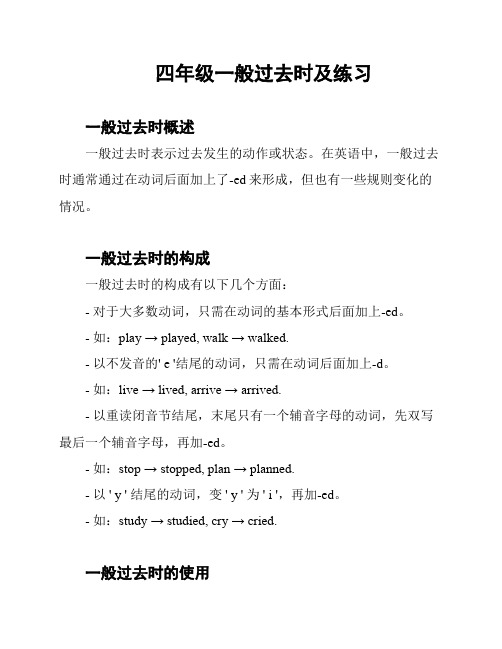
四年级一般过去时及练习一般过去时概述一般过去时表示过去发生的动作或状态。
在英语中,一般过去时通常通过在动词后面加上了-ed来形成,但也有一些规则变化的情况。
一般过去时的构成一般过去时的构成有以下几个方面:- 对于大多数动词,只需在动词的基本形式后面加上-ed。
- 如:play → played, walk → walked.- 以不发音的' e '结尾的动词,只需在动词后面加上-d。
- 如:live → lived, arrive → arrived.- 以重读闭音节结尾,末尾只有一个辅音字母的动词,先双写最后一个辅音字母,再加-ed。
- 如:stop → stopped, plan → planned.- 以 ' y ' 结尾的动词,变 ' y ' 为 ' i ',再加-ed。
- 如:study → studied, cry → cried.一般过去时的使用一般过去时常用于以下情况:- 过去发生的动作。
- 过去存在的状态。
- 过去的经验或惯。
- 过去的真相或常识。
一般过去时练下面是一些练,帮助你加强对一般过去时的理解和应用。
1. 选择正确的动词形式填空:- Yesterday, I (play / played) soccer with my friends.- They (stay / stayed) at a hotel during their vacation.- She (watch / watched) a movie last night.- We (visit / visited) the museum yesterday.2. 根据提供的动词,填写正确的一般过去时形式:- go: ____________- eat: ____________- do: ___________- see: ___________3. 改写下列句子,使用一般过去时:- I play basketball every weekend. (改写成一般过去时)小结一般过去时是表示过去发生的动作或状态的一种时态。
四年级一般过去时

一般过去时1.一般过去时表示过去某个时间发生的动作或存在的状态,常和表示过去的时间状语连用。
一般过去时也表示过去经常或反复发生的动作。
2.Be动词在一般过去时中的变化:⑴am和is在一般过去时中变为wa s(was not=wasn’t)⑵are在一般过去时中变为were(were not=weren’t)⑶带有was或were的句子,其否定、疑问的变化和is, am, are一样,即否定句在w as或we re后加n ot,一般疑问句把was或w ere调到句首。
3.句中没有be动词的一般过去时的句子否定句:didn’t +动词原形,如:Jim didn’t go home yester day.一般疑问句:在句首加di d,句子中的动词过去式变回原形。
如:Did Jim go home yester day?特殊疑问句:⑴疑问词+did+主语+动词原形?如:What did Jim do yester day?⑵疑问词当主语时:疑问词+动词过去式?如:Who went to home yester day?动词过去式变化规则:1.一般在动词末尾加-ed,如:watch-watched, cook-cooked2.结尾是e加d,如:phone-phoned3.末尾只有一个元音字母和一个辅音字母的重读闭音节,应双写末尾的辅音字母,再加-ed,如:stop-stoppe d4.以“辅音字母+y”结尾的,变y为i,再加-ed,如:cry-cried5.不规则动词过去式:am, is-was, are-were, do-did, see-saw, say-said, give-gave, get-got, go-went, come-came, have-had, eat-ate, take-took, run-ran,sing-sang, put-put, make-made, read-read, write-wrote, draw-drew,drink-drank, fly-flew, ride-rode, speak-spoke, sweep-swept, swim-swam,sit-sat, wear-wore, fall-fell, learn-leant, buy-bought, win-won过去时练习写出下列动词的过去式is\am_______ fly_______plant_______ are_______drink_______ play_______ go_______ make_______does_______ dance_______ worry________ ask_______taste_______ eat_______draw________ put_______throw_______ kick_______ pass_______ do_______Be动词的过去时练习(1)一、用be动词的适当形式填空1. I _______ at school just now.2. He ________ at the camp last week.3. We ________ studen ts two yearsago.4. They ________ on the farm a moment ago.5. Yang Ling ________ eleven yearsold last year.6. There________ an appleon the plateyester day.7. The mobile phone_______ on the sofa yester day evenin g.二、句型转换1. It was exciti ng.否定句:______________________________________________一般疑问句:___________________________________________ 肯、否定回答:__________________________________________ 2. All the studen ts were very excite d.否定句:______________________________________________一般疑问句:___________________________________________ 肯、否定回答:__________________________________________ 3. They were in his pocket.否定句:______________________________________________一般疑问句:___________________________________________ 肯、否定回答:__________________________________________Be动词的过去时练习(2)一、用be动词的适当形式填空1. I _______ an Englis h teache r now.2. She _______ happyyester day.3. They _______ glad to see each otherlast month.4. Helenand Nancy_______ good friend s.5. The little dog _______ two yearsold this year.6. Look, there_______ lots of grapes here.7. Today_______ the second of June. Yester day _______ the firstof June. It _______ Childr en’s Day. All the studen ts _______ very excite d.二、句型转换1. Therewas a car in frontof the housejust now.否定句:______________________________________________一般疑问句:___________________________________________肯、否定回答:__________________________________________行为动词的过去时练习(1)一、用动词的适当形式填空1. He ________ (live) in Wuxi two yearsago.2. The cat _______ (eat) a bird last night.3. We _______ (have) a partylast Hallow een.4. Nancy________ (pick) up orange s on the farm last week.5. I ________ (make) a modelship with Mike yester day.6. They _______ (play) chessin the classr oom last PE lesson.7. My mother _______ (cook) a nice food last Spring Festiv al.8. The girls_______ (sing) and _______ (dance) at the party.二、句型转换1. Su Hai took some photos at the Sports day.否定句:_______________________________________________一般疑问句:____________________________________________肯、否定回答:__________________________________________2. Nancywent to school early.否定句:________________________________________________一般疑问句:____________________________________________肯、否定回答:__________________________________________3. We sang some Englis h songs.否定句:________________________________________________一般疑问句:____________________________________________肯、否定回答:__________________________________________行为动词的过去时练习(2)一、用动词的适当形式填空1. I ______ (watch) a cartoo n on Saturd ay.2. Her father _______ (read) a newspa per last night.3. We ________ to the zoo yester day. (go)4. _______ you _______ (visit) your relati ves last Spring Festiv al?5. _______ he _______ (fly) a kite on Sunday? Yes, he _______.6. Gao Shan _______ (pull) up carrot s last Nation al Day holida y.7. I ______ (sweep) the flooryester day, but my mother _______.8. What ______ she _______ (find) in the garden last mornin g? She _______ (find) a beauti ful butter fly.二、句型转换1. They played footba ll in the playgr ound.否定句:______________________________________________一般疑问句:____________________________________________肯、否定回答:__________________________________________过去时综合练习(1)一、用动词的适当形式填空1. It _______ (be) Ben’s birthd ay last Friday.2. We all _______ (have) a good time last night.3. He ________ (jump) high on last Sports Day.4. Helen________ (milk) a cow on Friday.5. She likes_______ newspa pers, but she _______ a book yester day. (read)6. He _______ footba ll now, but they _______ basket balljust now. (play)7. Jim’s mother ________ (plant) treesjust now.8. _______ they ________ (sweep) the flooron Sunday? No, they _______.9. I _______ (watch) a cartoo n on Monday.10. We ________ (go) to school on Sunday.过去时综合练习(2)一、用动词的适当形式填空1. It _______ (be) the 2nd of Novemb er yester day.Mr White________ (go) to his office by car.2. Gao Shan ________ (put) the book on his head a moment ago.3. Don’t _______ the house. Mum _______ it yester day. (clean)4. What _______ you ______ just now? I _______ some housew ork. (do)5. They _________ (make) a kite a week ago.6. I want to _______ apples. But my dad _______ all of them last month. (pick)7. _______ he _______ the flower s this mornin g? Yes, he _______. (water)。
四年级英语语法知识点:一般过去时

四年级英语语法知识点:一般过去时
四年级英语语法知识点:一般过去时
四年级英语语法知识点:一般过去时
1.一般过去时表示过去某个时间发生的动作或存在的状态,常和表示过去的时间状语连用。
一般过去时也表示过去经常或反复发生的动作感谢。
2.Be动词在一般过去时中的变化:
⑴am和is在一般过去时中变为was(wasnot=wasn’t)
⑵are在一般过去时中变为were(werenot=weren’t)
⑶带有was或were的'句子,其否定、疑问的变化和is,am,are一样,即否定句在was或were后加not,一般疑问句把was或were调到句首。
3.句中没有be动词的一般过去时的句子
否定句:didn’t+动词原形,如:Jimdidn’tgohomeyesterday.
一般疑问句:在句首加did,句子中的动词过去式变回原形。
如:DidJimgohomeyesterday?
特殊疑问句:
⑴疑问词+did+主语+动词原形?
如:WhatdidJimdoyesterday?
⑵疑问词当主语时:疑问词+动词过去式?
如:Whowenttohomeyesterday?。
四年级一般过去时

一般过去时1.一般过去时表示过去某个时间发生的动作或存在的状态,常和表示过去的时间状语连用。
一般过去时也表示过去经常或反复发生的动作。
2.Be动词在一般过去时中的变化:⑴am和is在一般过去时中变为was(wasnot=wasn’t)⑵are在一般过去时中变为were(were not=weren’t)⑶带有was或were的句子,其否定、疑问的变化和is, am, are一样,即否定句在was 或were后加not,一般疑问句把was或were调到句首。
3.句中没有be动词的一般过去时的句子否定句:didn’t +动词原形,如:Jim didn’t go home yesterday.一般疑问句:在句首加did,句子中的动词过去式变回原形。
如:Did Jim go home yesterday?特殊疑问句:⑴疑问词+did+主语+动词原形?如:What did Jim do yesterday?⑵疑问词当主语时:疑问词+动词过去式?如:Who went to home yesterday?动词过去式变化规则:1.一般在动词末尾加-ed,如:watch-watched, cook-cooked 2.结尾是e加d,如:phone-phoned3.末尾只有一个元音字母和一个辅音字母的重读闭音节,应双写末尾的辅音字母,再加-ed,如:stop-stopped4.以“辅音字母+y”结尾的,变y为i,再加-ed,如:cry-cried5.不规则动词过去式:am,is-was, are-were, do-did, see-saw, say-said, give-gave, get-got, go-went, come-came, have-had, eat-ate, take-took, run-ran,sing-sang, put-put, make-made, read-read, write-wrote, draw-drew,drink-drank, fly-flew, ride-rode, speak-spoke, sweep-swept, swim-swam,sit-sat, wear-wore, fall-fell, learn-leant, buy-bought, win-won过去时练习写出下列动词的过去式is\am_______ fly_______ plant_______ are_______drink_______ play_______ go_______ make_______does_______ dance_______ worry________ ask_______taste_______ eat_______ draw________ put_______throw_______ kick_______ pass_______ do_______Be动词的过去时练习(1)一、用be动词的适当形式填空1. I _______ at school just now.2. He ________ at the camp last week.3. We ________ students two years ago.4. They ________ on the farm a moment ago.5. Yang Ling ________ eleven years old last year.6. There ________ an apple on the plate yesterday.7. The mobile phone _______ on the sofa yesterday evening.二、句型转换1. It was exciting.否定句:______________________________________________ 一般疑问句:___________________________________________ 肯、否定回答:__________________________________________ 2. All the students were very excited.否定句:______________________________________________ 一般疑问句:___________________________________________ 肯、否定回答:__________________________________________ 3. They were in his pocket.否定句:______________________________________________ 一般疑问句:___________________________________________ 肯、否定回答:__________________________________________Be动词的过去时练习(2)一、用be动词的适当形式填空1. I _______ an English teacher now.2. She _______ happy yesterday.3. They _______ glad to see each other last month.4. Helen and Nancy _______ good friends.5. The little dog _______ two years old this year.6. Look, there _______ lots of grapes here.7. Today _______ the second of June. Yesterday _______ the first of June. It _______ Children’s Day. All the students _______ very excited.二、句型转换1. There was a car in front of the house just now.否定句:______________________________________________一般疑问句:___________________________________________肯、否定回答:__________________________________________行为动词的过去时练习(1)一、用动词的适当形式填空1. He ________ (live) in Wuxi two years ago.2. The cat _______ (eat) a bird last night.3. We _______ (have) a party last Halloween.4. Nancy ________ (pick) up oranges on the farm last week.5. I ________ (make) a model ship with Mike yesterday.6. They _______ (play) chess in the classroom last PE lesson.7. My mother _______ (cook) a nice food last Spring Festival.8. The girls _______ (sing) and _______ (dance) at the party.二、句型转换1. Su Hai took some photos at the Sports day.否定句:_______________________________________________一般疑问句:____________________________________________肯、否定回答:__________________________________________2. Nancy went to school early.否定句:________________________________________________一般疑问句:____________________________________________肯、否定回答:__________________________________________3. We sang some English songs.否定句:________________________________________________一般疑问句:____________________________________________肯、否定回答:__________________________________________行为动词的过去时练习(2)一、用动词的适当形式填空1. I ______ (watch) a cartoon on Saturday.2. Her father _______ (read) a newspaper last night.3. We ________ to the zoo yesterday. (go)4. _______ you _______ (visit) your relatives last Spring Festival?5. _______ he _______ (fly) a kite on Sunday? Yes, he _______.6. Gao Shan _______ (pull) up carrots last National Day holiday.7. I ______ (sweep) the floor yesterday, but my mother _______.8. What ______ she _______ (find) in the garden last morning? She _______ (find) a beautiful butterfly.二、句型转换1. They played football in the playground.否定句:______________________________________________一般疑问句:____________________________________________肯、否定回答:__________________________________________过去时综合练习(1)一、用动词的适当形式填空1. It _______ (be) Ben’s birthday last Friday.2. We all _______ (have) a good time last night.3. He ________ (jump) high on last Sports Day.4. Helen ________ (milk) a cow on Friday.5. She likes _______ newspapers, but she _______ a book yesterday. (read)6. He _______ football now, but they _______ basketball just now. (play)7. Jim’s mother ________ (plant) trees just now.8. _______ they ________ (sweep) the floor on Sunday? No, they _______.9. I _______ (watch) a cartoon on Monday.10. We ________ (go) to school on Sunday.过去时综合练习(2)一、用动词的适当形式填空1. It _______ (be) the 2nd of November yesterday.Mr White ________ (go) to his office by car.2. Gao Shan ________ (put) the book on his head a moment ago.3. Don’t _______ the house. Mum _______ it yesterday. (clean)4. What _______ you ______ just now? I _______ some housework. (do)5. They _________ (make) a kite a week ago.6. I want to _______ apples. But my dad _______ all of them last month. (pick)7. _______ he _______ the flowers this morning? Yes, he _______. (water)。
- 1、下载文档前请自行甄别文档内容的完整性,平台不提供额外的编辑、内容补充、找答案等附加服务。
- 2、"仅部分预览"的文档,不可在线预览部分如存在完整性等问题,可反馈申请退款(可完整预览的文档不适用该条件!)。
- 3、如文档侵犯您的权益,请联系客服反馈,我们会尽快为您处理(人工客服工作时间:9:00-18:30)。
一般过去时1.一般过去时表示过去某个时间发生的动作或存在的状态,常和表示过去的时间状语连用。
一般过去时也表示过去经常或反复发生的动作。
2.Be动词在一般过去时中的变化:⑴am和is在一般过去时中变为was(was not=wasn’t)⑵are在一般过去时中变为were(were not=weren’t)⑶带有was或were的句子,其否定、疑问的变化和is, am, are一样,即否定句在was 或were后加not,一般疑问句把was或were调到句首。
3.句中没有be动词的一般过去时的句子否定句:didn’t +动词原形,如:Jim didn’t go home yesterday.一般疑问句:在句首加did,句子中的动词过去式变回原形。
如:Did Jim go home yesterday?特殊疑问句:⑴疑问词+did+主语+动词原形?如:What did Jim do yesterday?⑵疑问词当主语时:疑问词+动词过去式?如:Who went to home yesterday?动词过去式变化规则:1.一般在动词末尾加-ed,如:watch-watched, cook-cooked2.结尾是e加d,如:phone-phoned3.末尾只有一个元音字母和一个辅音字母的重读闭音节,应双写末尾的辅音字母,再加-ed,如:stop-stopped4.以“辅音字母+y”结尾的,变y为i,再加-ed,如:cry-cried5.不规则动词过去式:am, is-was, are-were, do-did, see-saw, say-said, give-gave, get-got, go-went, come-came, have-had, eat-ate, take-took, run-ran,sing-sang, put-put, make-made, read-read, write-wrote, draw-drew,drink-drank, fly-flew, ride-rode, speak-spoke, sweep-swept, swim-swam,sit-sat, wear-wore, fall-fell, learn-leant, buy-bought, win-won过去时练习写出下列动词的过去式is\am_______ fly_______ plant_______ are_______drink_______ play_______ go_______ make_______does_______ dance_______ worry________ ask_______taste_______ eat_______ draw________ put_______throw_______ kick_______ pass_______ do_______Be动词的过去时练习(1)一、用be动词的适当形式填空1. I _______ at school just now.2. He ________ at the camp last week.3. We ________ students two years ago.4. They ________ on the farm a moment ago.5. Yang Ling ________ eleven years old last year.6. There ________ an apple on the plate yesterday.7. The mobile phone _______ on the sofa yesterday evening.二、句型转换1. It was exciting.否定句:______________________________________________ 一般疑问句:___________________________________________ 肯、否定回答:__________________________________________ 2. All the students were very excited.否定句:______________________________________________ 一般疑问句:___________________________________________ 肯、否定回答:__________________________________________ 3. They were in his pocket.否定句:______________________________________________ 一般疑问句:___________________________________________ 肯、否定回答:__________________________________________Be动词的过去时练习(2)一、用be动词的适当形式填空1. I _______ an English teacher now.2. She _______ happy yesterday.3. They _______ glad to see each other last month.4. Helen and Nancy _______ good friends.5. The little dog _______ two years old this year.6. Look, there _______ lots of grapes here.7. Today _______ the second of June. Yesterday _______ the first of June. It _______ Children’s Day. All the students _______ very excited.二、句型转换1. There was a car in front of the house just now.否定句:______________________________________________一般疑问句:___________________________________________肯、否定回答:__________________________________________行为动词的过去时练习(1)一、用动词的适当形式填空1. He ________ (live) in Wuxi two years ago.2. The cat _______ (eat) a bird last night.3. We _______ (have) a party last Halloween.4. Nancy ________ (pick) up oranges on the farm last week.5. I ________ (make) a model ship with Mike yesterday.6. They _______ (play) chess in the classroom last PE lesson.7. My mother _______ (cook) a nice food last Spring Festival.8. The girls _______ (sing) and _______ (dance) at the party.二、句型转换1. Su Hai took some photos at the Sports day.否定句:_______________________________________________一般疑问句:____________________________________________肯、否定回答:__________________________________________2. Nancy went to school early.否定句:________________________________________________一般疑问句:____________________________________________肯、否定回答:__________________________________________3. We sang some English songs.否定句:________________________________________________一般疑问句:____________________________________________肯、否定回答:__________________________________________行为动词的过去时练习(2)一、用动词的适当形式填空1. I ______ (watch) a cartoon on Saturday.2. Her father _______ (read) a newspaper last night.3. We ________ to the zoo yesterday. (go)4. _______ you _______ (visit) your relatives last Spring Festival?5. _______ he _______ (fly) a kite on Sunday? Yes, he _______.6. Gao Shan _______ (pull) up carrots last National Day holiday.7. I ______ (sweep) the floor yesterday, but my mother _______.8. What ______ she _______ (find) in the garden last morning? She _______ (find) a beautiful butterfly.二、句型转换1. They played football in the playground.否定句:______________________________________________一般疑问句:____________________________________________肯、否定回答:__________________________________________过去时综合练习(1)一、用动词的适当形式填空1. It _______ (be) Ben’s birthday last Friday.2. We all _______ (have) a good time last night.3. He ________ (jump) high on last Sports Day.4. Helen ________ (milk) a cow on Friday.5. She likes _______ newspapers, but she _______ a book yesterday. (read)6. He _______ football now, but they _______ basketball just now. (play)7. Jim’s mother ________ (plant) trees just now.8. _______ they ________ (sweep) the floor on Sunday? No, they _______.9. I _______ (watch) a cartoon on Monday.10. We ________ (go) to school on Sunday.过去时综合练习(2)一、用动词的适当形式填空1. It _______ (be) the 2nd of November yesterday.Mr White ________ (go) to his office by car.2. Gao Shan ________ (put) the book on his head a moment ago.3. Don’t _______ the house. Mum _______ it yesterday. (clean)4. What _______ you ______ just now? I _______ some housework. (do)5. They _________ (make) a kite a week ago.6. I want to _______ apples. But my dad _______ all of them last month. (pick)7. _______ he _______ the flowers this morning? Yes, he _______. (water)。
